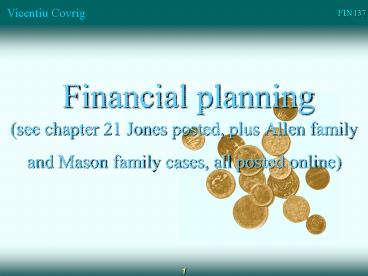Financial planning - PowerPoint PPT Presentation
Title:
Financial planning
Description:
Financial planning (see chapter 21 ... Investment Objectives Investment Constraints Investment Objectives Need to specify return and risk objectives Need to consider ... – PowerPoint PPT presentation
Number of Views:116
Avg rating:3.0/5.0
Title: Financial planning
1
- Financial planning
- (see chapter 21 Jones posted, plus Allen family
and Mason family cases, all posted online)
2
Individual Investor Life Cycle
- The individual investors life cycle can often be
described using four separate phases or stages - Accumulation Phase
- Consolidation Phase
- Spending Phase
- Gifting Phase
3
Accumulation Phase
- Early to middle years of careers
- Attempting to satisfy intermediate and long-term
goals - Net worth is usually small, debt may be heavy
- Long-term investment horizon means usually
willing to take moderately high risks in order to
make above-average returns
4
Consolidation Phase
- Past career midpoint
- Have paid off much of their accumulated debt
- Earnings now exceed living expenses, so the
balance can be invested - Time horizon is still long-term, so moderately
high risk investments are still attractive
5
Spending Phase
- Usually begins at retirement
- Living expenses covered by Social Security and
retirement plans - Changing emphasis toward preservation of capital,
but still want investment values to keep pace
with inflation
6
Gifting Phase
- Can be concurrent with spending phase
- If resources allow, individuals can now use
excess assets to provide gifts to other
individuals or organizations - Estate planning becomes important, especially tax
considerations
7
The Portfolio Management Process
- 1. Policy statement
- Specifies investment goals and acceptable risk
levels - The road map that guides all investment
decisions
8
The Portfolio Management Process
- 2. Study current financial and economic
conditions and forecast future trends - Determine strategies that should meet goals
within the expected environment - Requires monitoring and updates since financial
markets are ever-changing
9
The Portfolio Management Process
- 3. Construct the portfolio
- Given the policy statement and the expected
conditions, go about investing - Allocate available funds to meet goals while
managing risk
10
The Portfolio Management Process
- 4. Monitor and update
- Revise policy statement as needed
- Monitor changing financial and economic
conditions - Evaluate portfolio performance
- Modify portfolio investments accordingly
11
The Policy Statement
- Dont try to navigate without a map!
- Important Inputs
- Investment Objectives
- Investment Constraints
12
Investment Objectives
- Need to specify return and risk objectives
- Need to consider the risk tolerance of the
investor - Return goals need to be consistent with risk
tolerance
13
Investment Objectives
- Possible broad goals
- Capital preservation
- Maintain purchasing power
- Minimize the risk of loss
- Capital appreciation
- Achieve portfolio growth through capital gains
- Accept greater risk
14
Investment Objectives
- Current income
- Look to generate income rather than capital gains
- May be preferred in spending phase
- Relatively low risk
- Total return
- Combining income returns and reinvestment with
capital gains - Moderate risk
15
Investment Constraints
- These factors may limit or at least impact the
investment choices - Liquidity needs
- How soon will the money be needed?
- Time horizon
- How able is the investor to ride out several bad
years? - Legal and Regulatory Factors
- Legal restrictions often constrain decisions
- Retirement regulations
16
Investment Constraints
- Tax Concerns
- Realized capital gains vs. Ordinary income?
- Taxable vs. Tax-exempt bonds?
- Regular IRA vs. Roth IRA?
- 401(k) and 403(b) plans
- Unique needs and preferences
- Perhaps the investor wishes to avoid types of
investments for ethical reasons
17
Allen family case
Investment policy the Trust Objectives Return
requirements Risk tolerances Constraints Liqui
dity Time Horizon Laws and regulations Taxes U
nique preferences and circumstances
18
Investment policy George Allen Objectives Retu
rn requirements Risk tolerances Constraints Li
quidity Time Horizon Laws and
regulations Taxes Unique preferences and
circumstances
19
Capital market outlook Asset Allocation
20
Final Exam (take home)
- Final Exam consists of the Case study posted on
line (80) - For the exam study, carefully Allen Family and
Mason Family cases. - For the remaining 20 please answer the following
questions - Chapter 7, Bodie Kane Marcus problem 13
- Chapter 15, Eun and Resnick, problem 2
- Chapter 10, Strong, question 20a
- Chapter 10, Strong, question 20b































